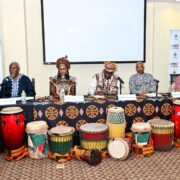As Haitian gangs expand control, cop’s family is left shaken
Black Immigrant Daily News
Every day when Daniel Marie Carmel’s husband put on his flak vest and walked out the door for another day of fighting Haiti’s gangs, she wondered if he would come home that night.
Friday was the day her smiling spouse of 18 years, Ricken Staniclasse, didn’t.
One of the country’s nearly 200 gangs ambushed his police unit that morning, sending gunfire echoing through the streets in an unexpected area — a mansion-lined stretch of the country’s capital, Port-Au-Prince.
A gang lead by Lionel Lazarre battled the police patrol under the sweltering Caribbean heat as officers desperately called for backup. But help never came, the country’s police union said.
The fighting killed three officers, hospitalized a fourth with bullet wounds and left the 44-year-old Staniclasse missing.
Carmel, meanwhile, was terrified for herself and their three children.
“My husband was fighting a lot with the gangs, and we don’t know what could happen to us,” Carmel, 43, said while curled up on her red couch surrounded by neighbors. “I can’t sleep at the house anymore because I don’t know what could happen to us.”
While the United Nations estimates that 60% of Port-Au-Prince is controlled by the gangs, nowadays most Haitians on the street reckon that number is closer to 100%.
Haiti has struggled with endemic gang violence for years, but the country spiraled into lawlessness after the 2021 killing of former President Jovenel Mo?se.
Powerful gangs have taken advantage of the political chaos and discontent with the current government led by Prime Minister Ariel Henry to further consolidate their control.
The government has failed to ease the violence, forcing many to flee their homes. News of rapes, kidnappings and ambushes on police have become the new norm.
Jolicoeur Allande Serge, director of the police unit that was attacked, said the Friday blitz in the Petion-Ville neighbhood was a sign of that. He noted that moving into upper class areas “benefits (the gangs’) economic interests.”
Kidnappings and ransoms as high as $1 million have been a key part of the financing for such armed groups.
Analysts expect the bloodshed to get worse, especially after Haiti’s final 10 elected officers ended their Senate terms in early January, leaving the parliament and presidency unfilled because the government has failed to hold elections.
Critics say that has turned Haiti into a “de-facto dictatorship.”
Meanwhile, people like Daniel Marie Carmel feel hope drain for their country. Carmel said her husband always hoped he could help clean up his city. Together, they built a home and a life together. Their 11-year-old son dreamed of following in his father’s footsteps.
“He loved people, he loved to help people,” she said of her husband.
But two years ago, violence began to get so bad in their neighborhood that they applied for a visa to migrate to the United States, hoping to join an exodus of people leaving Haiti. They never got a reply.
“I don’t know if he’s alive or dead, but I’m worried,” she said. “If we were able to leave the country, my husband would be alive.”
Donate At Caribbean News Service, we do not charge for our content and we want to keep it that way. We are seeking support from individuals and organisations so we can continue our work & develop CNS further.
NewsAmericasNow.com









Leave a Reply
Want to join the discussion?Feel free to contribute!